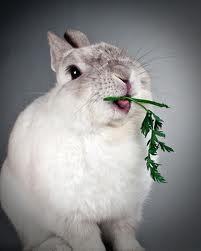 Vegetables can be an important part of a rabbit’s balanced diet. For rabbits who drink little water, fresh vegetables can help to provide much needed hydration. It is important to realize, however, that some rabbits tolerate vegetables well, while others may suffer from gas or runny stools if they consume too many or the wrong kind of vegetables. Try to offer rabbits who tolerate vegetables well an assortment of vegetables daily. A typical daily serving of vegetables would be approximately 2 cups per 6 lbs of body weight.
Vegetables can be an important part of a rabbit’s balanced diet. For rabbits who drink little water, fresh vegetables can help to provide much needed hydration. It is important to realize, however, that some rabbits tolerate vegetables well, while others may suffer from gas or runny stools if they consume too many or the wrong kind of vegetables. Try to offer rabbits who tolerate vegetables well an assortment of vegetables daily. A typical daily serving of vegetables would be approximately 2 cups per 6 lbs of body weight.
New veggies should be introduced slowly, even when your rabbit is used to eating fresh food. Start by giving your rabbit a small quantity of a new veggie, then check for soft stools, diarrhea or gas. A rabbit with gas may shift around excessively, sit hunched up or press his stomach into the ground. If any of these problems occur, do not feed any more of that vegetable. You will know within 12 hours if your rabbit doesn’t tolerate a particular veggie.
Try some of the following rabbit safe veggies:
- Alfalfa Sprouts
- Artichoke leaves
- Arugula
- Asparagus
- Basil
- Beet greens (tops only)
- Bell Peppers
- Bok Choy
- Carrot tops*
- Celeriac
- Celery
- Cilantro
- Collard greens*
- Cucumber
- Chickory greens*
- Clover (White Only)
- Chinese/Nappa Cabbage
- Dandelion greens (no pesticides)
- Dark green/Red Leaf lettuce
- Dill
- Endive
- Escarole
- Fennel
- Kale*
- Lovage
- Mint
- Mustard greens
- Parsley (curly & plain)*
- Pumpkin
- Raddichio
- Radish tops
- Raspberry Leaves
- Romaine lettuce
- Spinach*
- Swiss Chard (red & green)
- Turnip greens
- Wheat Grass
- Watercress
Bunny Safe Fruits:
- Apple
- Banana
- Blueberry
- Canteloupe
- Grapes
- Honey Dew Melon
- Kiwi
- Peach (pits are toxic)
- Cherry (pits are toxic)
- Papaya
- Pear
- Pineapple
- Raspberry
- Strawberry
- Watermelon
- Carrots* (are high in sugar and should only be offered as a treat)
*Safe In Moderation:
- Broccoli
- Brussel Sprouts
- Cabbage
- Cauliflower
- Kale
- Mustard Greens
- Radish Tops
- Spinach
* High in calcium or oxalates. Although high calcium vegetables contain less digestible calcium per volume than alfalfa hay or alfalfa based pellets, it is important to note that excess dietary calcium, along with other factors, may cause bladder stones or sludge in some rabbits. In addition, consuming vegetables that are high in oxalates in large quantities or on a daily basis may cause crystals or stones to form in the kidneys.
Other things to keep in mind when feeding your rabbit fresh foods:
- Remember to wash the greens thoroughly under running water.
- Feeding your rabbit wet greens is an excellent way to increase his water
consumption. - Never give a rabbit spoiled greens! They can make your rabbit very ill.
- Light coloured head lettuces, such as iceberg, have little nutritional value.
- It is best not to give the same greens everyday. All vegetables contain various
amounts of vitamins, so providing a variety ensures a more balanced diet.

